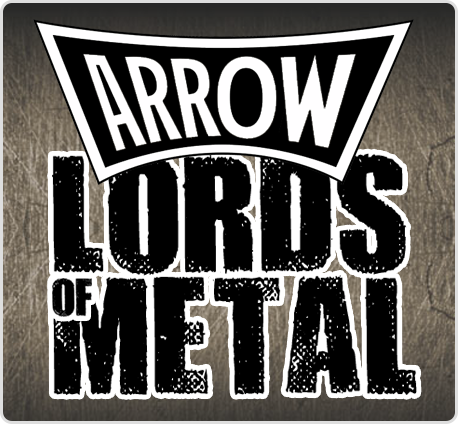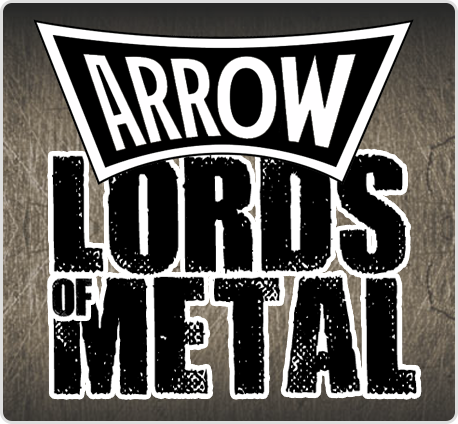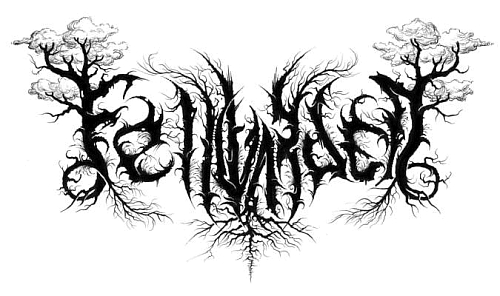
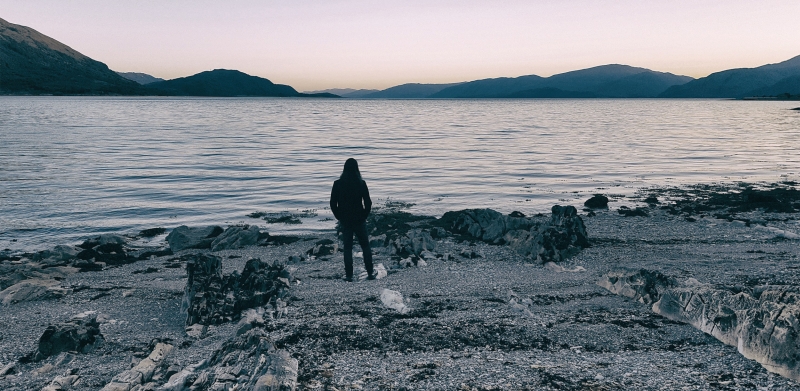
The Watcher: “As a species, we may have the power to split the atom, put humans into space and observe the births of stars but one simple shrug of a tectonic plate and the devastation that follows reminds us that nature will always out.”
The Watcher (Frank Allain) is de stuwende kracht achter Fen, maar naast deze atmosferische black metal band is er ook nog zijn meer persoonlijke uitlaatklep onder de noemer Fellwarden. Onlangs bracht deze Engelse outfit het tweede album ‘Wreathed In Mourncloud’ op de markt en daarover hadden we een diepgaand gesprek met de schepper van al dit fraais met de beschouwende naam The Watcher.
Vera Matthijssens Ι 08 augustus 2020
Hello Frank! How are you doing? I hope you are healthy in the UK. In December we did an interview for your other band Fen, but now that Fellwarden has its amazing sophomore album out, let us shine a light on this one too.
I’m not doing too badly thanks, all things considered – somewhat claustrophobic and rather worried in many respects but I, my family and my friends are all healthy so we must be thankful for this at least. It’s an unusual time for everyone for sure – and particularly for the music scene in general with the amount of uncertainty, concern and fear for the future that rightly bleeds through into every strata of this industry. We may only have spoken 6-7 months or so ago, but so much has changed in that time, it almost seems like a different world! One positive of course however has been the second Fellwarden album ‘Wreathed In Mourncloud’ finally seeing the light of day. This is a big personal achievement and I really am very satisfied with how the record has turned out – in terms of the ‘goal’ I had set myself when starting this particular album, this is probably the closest the result has been to the original ambition of a release that I have achieved with any artistic outlet. The atmosphere, the sense of the journey within, the layering and of course Kris Verwimp’s outstanding cover art really do fulfil my aim of creating something totally immersive. It has taken a while for sure – the composition/recording process for this began right at the start of 2017 after all – so I have been living with a lot of this material for a few years now. Nevertheless, it still manages to capture that sense of rugged splendour and personal challenge of marching across the weather-beaten flanks of the fells under grey clouds heavy with the promise of rain and for this alone, I take pride in what has been created.
In 2014 you have formed Fellwarden as side-project. Why this need while you are also the composer of Fen?
For many years I had entertained the prospect of creating a studio-based ‘one man’ black metal project that really focussed on the more epic, atmospheric aspect of the genre. Something that would take the power and bombast of acts such as mid-90s Emperor, Dimmu Borgir and Gehenna, fuse it with the sheer overwhelming scope of Moonsorrow and throw in elements of Viking-era Bathory – all whilst injecting it with my own sense of reflection and ambience. It was an idea that I was simply content to continue to ‘kick down the road’ to another day so to speak, something that I felt I’d eventually get around to. Like all such things beset by procrastination, eventually the day came where I realised that it was time to actually get off of my backside and do something about this. It was literally a moment of standing up and saying ‘right – time to get on with this’ and very quickly set about working on the material that would form the basis of the first record, ‘Oathbearer’. There are of course similarities with Fen – it would be impossible not to be, given my involvement in both – but Fen is very much a band. The focus there is on forging organic, dynamic material that can be rendered in the live environment. Fellwarden I guess is ‘freeing’ in some ways – I do not need to feel limited by what we can achieve live and can therefore really indulge myself in terms of layering, multi-tracking, utilising layers of synth, lead guitar, acoustic and so on. It really does allow me to explore a more soundtrack-like approach to composition and creation – indeed, much of the record developed from a melodic/harmonic perspective as the recording progressed, allowing me to add layer upon layer to hear the subtle but important shifts in how passages evolved. It also enables me to forge material from a different standpoint – after all, Fen has been in existence for over fifteen years now and with six albums, is very much a defined entity with its own sound and approach. We know intrinsically how to approach the creative process for Fen, there is a subconscious sense of ‘belonging’ that clicks into gear when we start to look at working on material for Fen. Fellwarden therefore acts as a vessel for different impulses, for an aspect of me that is driven to express in alignment of different atmospheres that simply would not be appropriate for Fen. Lest we forget, Fen came from – and is still rooted – in a more post-rock/progressive/shoegaze inspired path to forging black metal. Fellwarden adopts a more traditionalist approach to the genre if you will – it hearkens back to the mystical thrill of the emerging atmospheric black metal scene in the early-mid 90s but with one eye also on the future to move that sound forward. It’s more about a sense of the immense as opposed to the bleak; about defiance and remembrance as opposed to sorrowful reflection and furious despair.
So let us first summarize for the readers: which approaches are different between both of these bands? How do you select and choose the material for Fellwarden (and what goes to Fen?) or is it just a matter of instinctive feeling?
If I’m honest, I more or less know before I pick up my guitar which creative mindset I am in before I start to work on composition. As you say, there is an instinctive feeling which is hard to identify or describe that really steers where the writing process goes at any given moment. As with any subjective or creative process however, it is rarely an exact science and there are times when I will start to work on a piece and it becomes very apparent it isn’t suitable for the entity for which I set out to work on music for. When it comes to writing, I am not a particularly structured or ‘rigid’ kind of guy – I like to work organically, setting time aside to explore ideas, themes, notions and see what emerges. I’ve always been like this – some people are very focussed, will know exactly what they want to achieve and be able to sit down to extract exactly what is in their head. I occasionally have moments like this but they are sadly few and far between! It normally starts with a vague sense of a melody or ambience that I’d like to develop – it is then a case of sonic exploration with the guitar and a glass of good whisky, pushing through the layers of the everyday and life’s myriad distractions (which can be such a roadblock to true creativity) in an effort to uncover true inspiration. It takes work, focus and time for me – but there is no greater sense of purpose or self-worth than finally fashioning a piece of music that fully articulates what you are attempting to express. Fellwarden simply provides me with another outlet for this, to deliver a different facet of expression that would not be appropriate for Fen. Indeed, for the third Fellwarden album (for which the writing process is significantly progressed) there are one or two elements of this which will be repurposed ideas that simply did not fit with Fen when they were originally written. Having revisited them, it’s clear that Fellwarden is the perfect medium to deliver these ideas and again highlights that this is a path of expression that really did need to be undertaken.
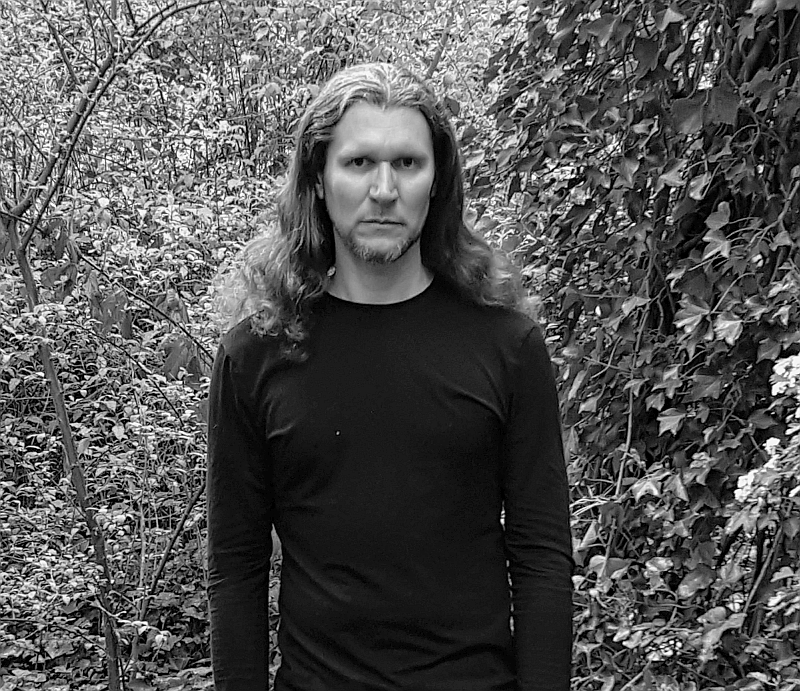
The songs brim with respect for the beauty of sceneries in North West England, but it goes deeper than that. For instance legends, myths and human existence in harmony (or not) with that, also shine through in the lyrics. Can you go a bit deeper into those lyrics, illustrating it with some (or all) of the songs?
As with most – if not all – of the lyrics I write, the lyrics of Fellwarden are deliberately structured to work on more than one level. Of course, celebration of the powerful landscapes of the fells is the most evident part of this and I have no issue with much of what is told within the songs being taken at face-value on this front. As you have indicated however, there are other tales being told within the body of the texts and other notions that it is important to me that are communicated. Much of it is how we use landscape and our surroundings as a metaphor for more human notions. In Fen, this is typically an internal or personal reflection – using the bleak landscapes of the fens almost as a mirror to our own soul and the bleakness that dwells within. In Fellwarden, this approach is more externalised, using the landscape as an embodiment or foil to the qualities of humanity as a whole. So to address some individual song concepts, ‘Pathmaker’ is relatively self-explanatory I think. It speaks of the trailblazers, the vanguards in our culture who forge the paths that others follow. It has its roots of inspiration in the myriad trails that weave throughout some of the most remote wildernesses in our landscape – the fact that someone has come before us and set out these trails, braved the unknown and set down the paths for generations to come. This is true in so many facets of life – philosophy, science, art, you name it – once a certain pathway has become established it is so easy for us to take these things for granted and lose sight of the bravery and inspiration that led someone to take those first steps. With ‘An Elder Reckoning’, I talk ultimately about the sacrifices that are made by the few on behalf of the many. This is an age-old theme – the noble volunteers, the stoic souls who grit their teeth and stand tall to put themselves in harm’s way when asked. It’s an interesting question – deep down, we all perceive ourselves as virtuous individuals who would not hesitate to ‘stand up and be counted’ when required. But how real is that? How many of us have actually been put to such a test. I really wanted to explore this notion with this piece.
I will also talk briefly about ‘Upon Stone’ here. This song really does focus upon man’s connection to landscape and addresses that nebulous moment when mankind evolved from mobile, nomadic hunter-gatherers to put down roots and then form the first foundations of modern civilisation. In some ways, those first decisions put in motion the inexorable trajectories towards today’s vast, megalithic cities of steel, concrete and glass – the stifling of the natural world, the annihilation of old sites, all in the name of progress. Were those first intrepid elders who – no doubt for the benefit of their people – decided to take root by the riverside’s of old or within the safe cradle of a verdant valley to know that their decisions would fundamentally alter the foundations of the world millennia later? I hope that this has provided some insights into the topics and themes that the album addresses. Of course, as with all that I write, much of what it set out is perfectly free to be interpreted by the observer in a way that resonates with them – there is no ‘hard and fast’ rule as to how these lyrics should be taken, I am simply outlining my own impulse and inspiration when writing them. If a reader wants to take them at complete face value as simply a stirring ode to magnificent landscapes then that is fine as this is in many ways what they also are!
There is a magnificent contrast between the quiescent fragile parts and the ferocious black metal parts. Is this also a kind of reflections of the powers of nature that gives us birth, but can be rude destruction as well?
Nature is all – let us not forget this. We ourselves are products of nature and therefore, it behoves us to accept all that nature has to offer and all that nature is capable of. As a species, we may have the power to split the atom, put humans into space and observe the births of stars but one simple shrug of a tectonic plate and the devastation that follows reminds us that nature will always out. With that in mind, there is of course a subconscious thread that runs through much of what I compose that deals with that duality that does indeed exist in nature – overwhelming immensity that can also be terrifying; the beauty that comes with nature’s destructive power; and the underlining reminder of how that which nurtures us can quite easily destroy us. Ultimately, the responsibility is on us in terms of how we interact with nature – quiet respect, an understanding of the patterns that exist, warning signs and simple acceptance of the vagaries of something that we have no choice but to co-exist with.
Nowadays you work together with drummer Havenless, also in Fen. Is his role only drummer or is he also involved in the crafting (arrangements, writing, etc) of a record?
Whilst I carry out all of the musical/melodic composition/arrangements, Havenless has full ownership of the drumming aspects of the records – whilst I will sometimes provide pointers as to the ‘feel’ of a certain passage or section, he is ultimately responsible for defining the patterns/rhythms used. We’ve worked together on various projects for a long time now and I think he has a real ‘instinct’ for where the percussion needs to go. It’s a productive, organic dynamic – it really helps me to know that I can rely on him to craft the perfect rhythmic bedrock to support the melodies and atmospheres of the songs. Indeed, on this latest record, he actually recorded all of the drums himself in his own recording space which was a considerable undertaking for him – and I think the results speak for themselves. It’s a balanced, organic sound with the right blend of clarity and space.
You worked together with Esoteric mastermind Greg Chandler. What about this experience in the studio?
I have worked with Greg together several times in the past and have always enjoyed tracking and mixing at his studio. In the case of ‘Wreathed In Mourncloud’ he was actually responsible for the mastering of the album (the tracking & mixing was carried out at mine & Havenless’s respective studios) so we were not actually physically present when he carried out the mastering process itself. He would share mastering outcomes with us to comment on and then make tweaks when required so it was perfectly possible to do this remotely. It really was the final piece of the puzzle for this album I think. There’s not a lot more I can add to the narrative that’s been firmly established surrounding Greg really – a complete professional with an absolute instinct for what needs to be done to bring the sound of an album up a notch or two. His communication is always excellent, his instincts well-honed and his commitment to quality unquestioning. The mastering of this record really added the final – essential – touch to bring it to life in my view.
The majestic artwork was done by Kris Verwimp. This is our most praised painter for metal in Belgium! How did you get to know him and please tell us about this cooperation?
Well, like most of us who have been around the black metal since the mid-90s, I am a huge fan of Kris’s art and along with Necrolord, his paintings are some of the defining images of the classic black metal atmosphere from this period. It’s no exaggeration to state that these aesthetics were as important for drawing me into the world of black metal as the music itself – utterly compelling imagery that provided the perfect visual accompaniment to the sounds therein. One of my intentions with ‘Wreathed In Mourncloud’ was to try and channel that feeling from those early days – that sense of excitement in discovering this unique genre, the cloak of mystery that seemed to hang over everything like a fog and the almost indescribable thrill of plunging into this new musical world. Yes, I won’t avoid the word ‘nostalgia’ because it’s important – it often gets used in a negative sense but for me, it’s actually a very positive energy to channel, to recapture the vibrancy and spirit of those early days. Everything now is so jaded, so cynical, so easy to access and strip the mystery from… So, I was committed to trying to get some ‘proper’ old-school, classic-atmosphere painted artwork to accompany this record. I mentioned this to Nico (the label boss of Eisenwald) and he informed me that he had worked with Kris on a few releases and he would put us in touch – though there were no guarantees!
What are the plans for the near future?
Given that Fellwarden is very much a studio-bound project for now, we haven’t really been as affected by the current global crisis as most artists have. We were starting to field questions relating to possible live performances but given the costs/time/investment we would need to put into bringing Fellwarden to the stage and the current state of the world, any sort of live experience feels further away than ever sadly. Nevertheless, I am one that always looks to the future and through the lens of what I can control – and given the current circumstances, that is writing/composition/recording. I have been crafting material for a third full-length album for some time now, bringing pieces together, working on themes, honing riffs. With that in mind, I’d say that another record is perhaps 75-80% written now and it’s really a case of drawing the strands together and finalising much of what is there. It’s likely that the recording process of this will commence in the Autumn of this year and it will simply be a case of taking my time, layering and slowly building up what I hope will be some truly stirring pieces that advance the Fellwarden sound yet further. I have some really cool ideas for a concept for the next album (if I say so myself) – it’ll be something of a departure thematically and may take a few people by surprise – but it’s something that I truly, passionately believe in. So watch this space!
If you’d like to add something, please feel free to do it here…
I think we have covered a lot here Vera – thanks again for the interview and so glad you like the record!
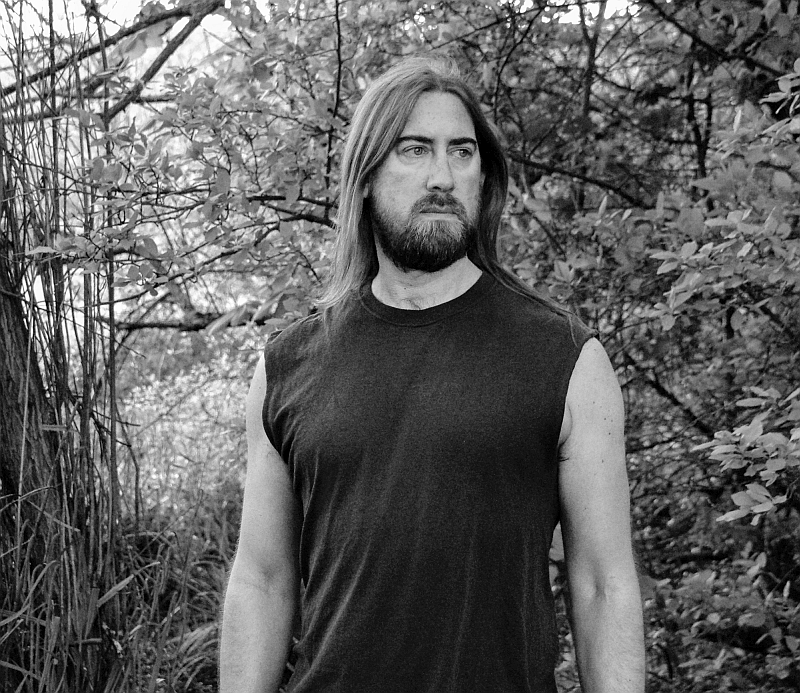
Check de onderstaande socials voor meer informatie over deze band.
